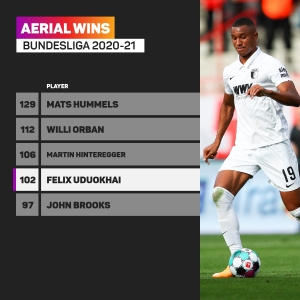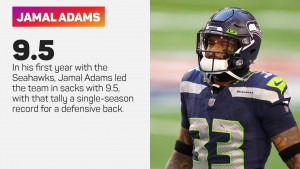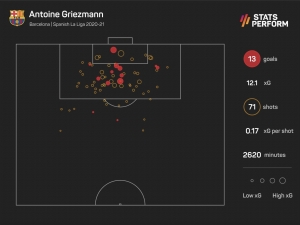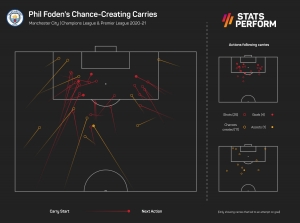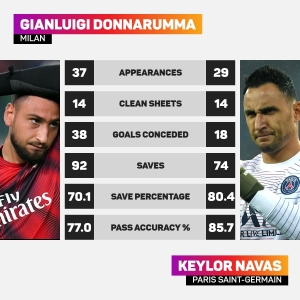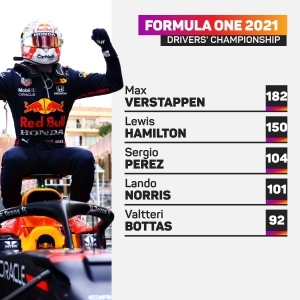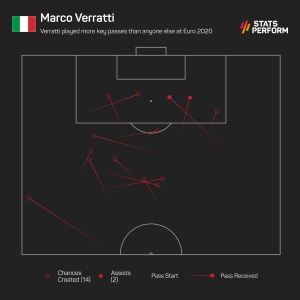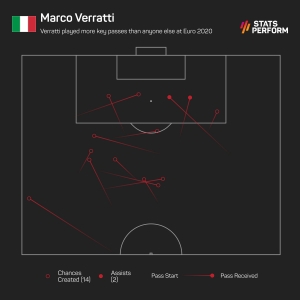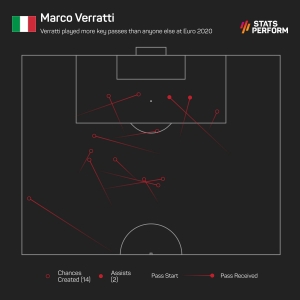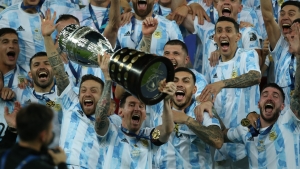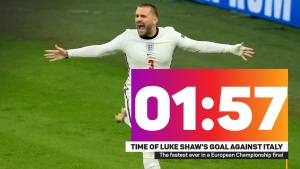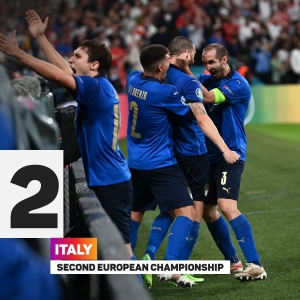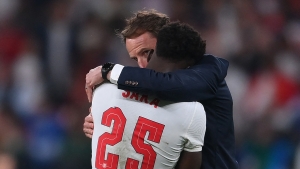Fifty-four passes. In two minutes and 41 seconds of unbroken possession during the closing stages of their Euro 2020 semi-final win over Denmark, England moved to the brink of a 2-1 win in beautifully assured fashion with a 54-pass move. Over the course of the entire additional half hour, they completed 198 passes – more than the Three Lions managed in the entirety of the 1-0 Euro 2000 win over Germany.
Thirty-eight passes. Five days later in the final, Gareth Southgate's team could only manage 38 successful passes in the entire first half of extra time against Italy. That ticked up to 47 during the final 15 minutes of the 1-1 draw but still stood in stark contrast to the supreme example of modern, pro-active game management from the preceding midweek.
Southgate has overseen a period of unprecedented progress during his time in charge of international football's most maligned underachievers. A final for the first time since 1966, back-to-back semi-finals for the first time since 1968. As a major tournament force, England are stronger than they have been at any time over the past half a century by some distance.
But large chunks of Sunday's final defeat to Roberto Mancini's brilliant side felt like they had been transplanted from the bad old days, long before a penalty shoot-out concluded a tale of heartbreak. The lack of control and accompanying slow, sinking feeling could have belonged to any era.
By the final whistle, Italy had completed 820 passes to England's 426. As well as being common to England setbacks of yesteryear, there was also a repeated pattern from two of Southgate's previously most notable defeats in charge. Dictating the terms against elite opponents and being able to wrestle back control during moments of high stress represents something of a final frontier with the 2022 World Cup in Qatar a little over 16 months away.
Verratti and Jorginho torment England like pass masters Modric and De Jong
Leonardo Bonucci scrambled in Italy's equaliser after 67 minutes at Wembley, Luke Shaw having given England a second-minute lead.
When Southgate's team went down to a 2-1 semi-final defeat against Croatia at the 2018 World Cup, Kieran Trippier's free-kick put them ahead in the fifth minute before Ivan Perisic equalised in the 68th and Mario Mandzukic won it in extra time.
In between those two games, England faced the Netherlands in the semi-finals of the inaugural Nations League. Marcus Rashford put them ahead from the penalty spot – yes, he's normally excellent at those – before Matthijs de Ligt equalised in the 73rd minute and the Dutch pulled clear in the first additional period.
First-half leads cancelled out by 67th, 68th and 73rd-minute goals can, of course, just be a coincidence. But England gradually ceded control in each match, conceded and never truly reasserted themselves.
On Sunday, Italy had deep-lying playmaker Jorginho and the masterful Marco Verratti calling the tune, while two years earlier the Netherlands had Frenkie de Jong and in Moscow, Luka Modric was at the peak of his powers. Each time, there was a level of midfield expertise to which England had no sufficient answer.
Raw passing statistics can sometimes be misleading. If a central defender racks up more passes than his team-mates – as Bonucci did at Wembley – it does not mean they are the best passer on the field, more that they have a higher frequency of simple passes to make due to their position.
But in the heat of a midfield battle, a player being able to compile pass after pass suggests they might be dictating terms.
At the Luzhniki Stadium, Modric made 71 passes, slightly fewer than his colleagues in the Croatia engine room Marcelo Brozovic (87) and Ivan Rakitic (84). England's starting midfield three – admittedly not a trio who matched up entirely with Croatia in a positional sense – of Jordan Henderson, Dele Alli and Jesse Lingard managed 48, 47 and 38 respectively.
If Modric led an ensemble performance, De Jong conducted England all by himself in Guimaraes a year later. The Barcelona midfielder made 104 passes over the course of 120 minutes, with England's starting midfielders Declan Rice, Fabian Delph and Ross Barkley managing 54, 24 and 56. Only Barkley saw the final whistle, while De Jong's passing accuracy of 96.2 per cent was almost identical to Rice (96.3) at nearly twice the output.
Paired with Leeds United's Kalvin Phillips, Rice had another tall task when taking on Jorginho and Verratti. Once again, it was a case of England chasing around after accomplished technicians.
Paris Saint-Germain's Verratti was in majestic form as he turned the contest in the Azzurri's favour. Of his 118 passes, 111 were successful and 72 came in the England half. Chelsea's Jorginho was similarly efficient with 94 out of 98 completed. Even allowing for Rice's 74th-minute substitution, the Opta statistics for himself (33 passes, 25 completed) and Phillips (39 passes, 30 completed) tell the story of their and England's night.
No passing, please, we're English
Despite the weekend sense of déjà vu, it is only fair to credit England with progress when coming up against technically superior midfields.
They gained a measure of revenge against Croatia, who they also beat en route to their Nations League date with the Netherlands, during the group stage and similarly shackled Germany – Toni Kroos, Leon Goretzka, Kai Havertz and all – in a 2-0 last-16 win.
As he did against Die Mannschaft, Southgate switched to a 3-4-3 for Italy and the formation initially overwhelmed Mancini's men, who were attacked repeatedly down their flanks.
This served to remove Italy's midfield superiority as a major factor in the contest until after half-time. Some have criticised Southgate for not being pro-active when the tide began to turn, failing to send on attacking threats such as Jadon Sancho and Jack Grealish to give the Azzurri new and different problems.
While those suggestions are valid, it is also fair to ponder whether England would simply have had fresh-legged spectators to the Verratti-Jorginho show. Studying data from the Premier League and across Europe's major divisions this season, it can be concluded that changing formation, funnelling play out wide and pressing judiciously are all work-arounds Southgate and his coaching team have developed for a problem to which they don't have a direct remedy.
In England's top flight in 2020-21, Manchester City's Rodri averaged the most passes per 90 minutes of midfielders to have made 20 or more appearances with 91.24. Next on the list were Chelsea's Mateo Kovacic (87.23), Liverpool's Thiago Alcantara (83.32) and Manchester United's Nemanja Matic (83.05), with Jorginho rounding out the top five on 79.68.
Considering players who featured at least 25 times in all competitions across the big five leagues, Verratti comes in second with a fairly absurd 96.86, from Sergio Busquets (94.63), Rodri and Kroos (88.37).
Miralem Pjanic's debut season at Barcelona was an utterly forgettable affair and one that could not be saved by him tiki-takaing himself to a standstill with 104.29 passes every 90 minutes. High passing numbers do not always mean a stand-out performer but illustrate a certain type of player – a type not readily available to Southgate.
Discounting Henderson's 92.85 per 90, given he played so often in 2020-21 at centre-back (meaning he was also ruled out of the Premier League rankings, having finished top at 95.69 from 21 outings), you have to scroll a decent way down this Europe-wide list to find some English representation.
The Premier League supplied three of last season's four European finalists and all of Manchester City, Chelsea and Manchester United boasted brilliant English players who were pivotal to their success. But in each case, overseas players were entrusted with the midfield duties that generally undo England.
Yet, in some respects, Qatar 2022 is further away than it might seem. If Euro 2020 had actually taken place in 2020, it is more likely Shaw, Kyle Walker and John Stones would have missed out on the squad rather than made up three-quarters of Southgate's first-choice defence. Bukayo Saka, Phil Foden, Reece James, Conor Coady, Jude Bellingham, Dominic Calvert-Lewin, Phillips and Grealish had not made their international debuts this time last year.
A lot can change between then and now, so who might emerge as a king of control for Southgate?
A nudge from Winks? Skipp to it?
The highest ranked English midfielder on the top-five leagues list is Tottenham's Harry Winks, who averaged 71.47 passes every 90 minutes over the course of 28 appearances.
Only 15 of those were in the Premier League and nine were starts. Getting regular football, largely due to a succession of injury problems, has been a problem for the 25-year-old, who is now being linked with a move away from Spurs.
However, Southgate is a fan and is responsible for giving Winks all 10 of his England caps to date. A Shaw-style renaissance is certainly possible.
One factor that might cause him to seek pastures new is Oliver Skipp's return to Tottenham from a successful loan spell at Norwich City.
While helping the Canaries to promotion from the Championship, the 20-year-old averaged 58.52 passes per 90. Nowhere near the towering numbers posted by Europe's best but the third highest among midfielders to have played 30 or more times in a competition of a very different nature.
Skipp has represented England at under-21 level and the pathway from there to the seniors is clear in the Southgate era.
Winks was the only English midfielder to average above 70 passes per 90 on our European list, although Curtis Jones (68.04) – hoping for a more prominent role at Liverpool this season – and provisional Euros squad member James Ward-Prowse (64.75) are other options who might treat the ball with a little more TLC.
Can the men in possession be better in possession?
It might seem perverse to say England need to vastly improve their control in midfield, while claiming Rice and Phillips each had fine tournaments, but both statements are true.
Southgate is not averse to hard-nosed selection decisions but whatever the formation or opponent, the West Ham and Leeds favourites started each match in central midfield. Rice's 12 interceptions were only bettered by Jorginho (25) and N'Golo Kante (14), while the Italy lynchpin recovered possession 48 times – shading Phillips (45) and lying behind Pierre-Emile Hojbjerg (51).
With the ball, they did not perform their deep-lying roles like Jorginho or De Jong – even allowing for some of Rice's ravishing first-half dribbles in the final – because they were not asked to. Which leads to the obvious question: could they do it?
Plenty of good judges certainly seem to hold Rice in that regard, as evidenced by persistent links to Chelsea and Manchester United. He averaged 47.7 passes per 90 minutes last season and, for all that they enjoyed a brilliant season under David Moyes, West Ham's average possession figure of 42.53 was the sixth lowest in the division.
To understand the full range of Rice's prowess and potential to be England's metronome, it might be necessary to view him on a weekly basis in a different setting.
The same need not be said for Phillips, who did not pick up his "Yorkshire Pirlo" nickname on account of interceptions or recoveries. Control is not always the primary aim of Marcelo Bielsa's high-intensity and ravenous pressing style, all whirring parts and thrills, but Phillips averaged 52.02 passes per 90 last term in the Premier League.
Again, this is not up there with the elite distributors in Europe, but it is a useful return at odds with his 39 passes over the course of 120 minutes versus Italy.
Bridging the gr-8 divide
At Leeds, Phillips will generally have more forward passing in closer proximity than those that were granted to him at Wembley on Sunday. This is where the configuration of Southgate's midfield is worth consideration.
It will be intriguing to see whether he returns to a 4-3-3 with two number eights as opposed to a 4-2-3-1 with two holders and a 10 when England resume World Cup qualifying in September.
The defeat to a De Jong-inspired Netherlands and a wild 5-3 Euros qualifying win over Kosovo later in 2019 were influential in the England boss choosing a more cautious approach for Euro 2020, shelving an expansive 4-3-3.
A run to the final without conceding a goal from open play means that decision cannot really be disputed. But perhaps this newfound defensive solidity means the shackles can be loosened once more, allowing more attack-minded players to operate centrally.
The control that eluded England in the matches discussed above was not simply as a result of metronomic passing. De Jong (16) was second only to Raheem Sterling (20) for dribbles completed at Euro 2020, while Verratti had three carries resulting in a chance. Five from Hojbjerg, Lorenzo Insigne and Gareth Bale topped the list in the competition.
Ability to carry the ball, both to ease pressure through linking the play along with creating chances, sounds like quite a good description of Foden. The Manchester City youngster's injury absence felt more regrettable as the final pressed on.
In pre-recorded introductions for ITV's Euro 2020 coverage, Foden described himself as a central midfielder. It is where he played the vast majority of his youth football for City and during most of his early first-team outings.
But in a 2020-21 campaign when it was hoped he would step forward as David Silva's playmaking replacement, he in fact filled the void left by Leroy Sane and turned in electrifying performances on the left wing.
"Phil just needs time to improve playing inside," Pep Guardiola said when discussing Foden's positional change earlier this year.
"When you play as a winger you have to play at one tempo and when you play inside you have to play in another one. When he gets this balance he will be 10 times more extraordinary as a player. It’s just a question of time."
Southgate will have an eye on that ticking clock and also how Mason Mount is used by another esteemed tactician. The Chelsea youngster has played as an eight for club and country but was used almost exclusively in the front three after Thomas Tuchel replaced Frank Lampard at Stamford Bridge and plotted a path to Champions League glory.
There are few English players more elegant and effective when it comes to running with the ball at his feet than Grealish. In 2020-21, international team-mate Harry Maguire and Leeds full-back Luke Ayling were the only English players to have more than his 172 instances of carrying the ball towards goal for 10 metres or more. Mount (138) came seventh on that progressive carries list.
But, like Foden and Mount, most of Grealish's best recent work has come in the forward line. The likes of Verratti and De Jong are masters of their craft because they play in their position every week.
Still, dropping one of his twinkle-toed playmakers a touch deeper might become an irresistible work-around, especially if paired with a Henderson back to his talismanic best in central midfield for Liverpool. In 2019-20 he was the heartbeat of the side that won the Premier League, averaging 74.44 passes per 90 into the bargain. Suffering against Modric and Croatia before failing to stem the tide when short of match fitness versus Italy should not cloud perceptions of the 31-year-old's supreme qualities.
Then there is the tantalising prospect of Bellingham's next stage of development under the highly regarded Marco Rose at Borussia Dortmund. The 18-year-old could be frighteningly good by the time the 2022 World Cup rolls around. If Southgate can hit upon a formula for midfield that can both dictate and create, we could be able to say the same for England.

























